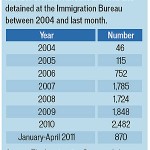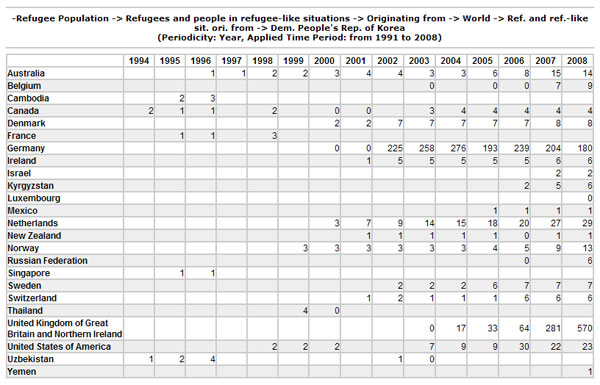UPDATE 3 (2013-11-24): NPR offers more details:
In Pyongyang, a spokesman for North Korean’s foreign ministry responded last week with a sharply worded statement saying the country strictly forbids drug manufacturing drug smuggling. It called the case “another politically motivated puerile charade” spread by “the Western reptile media.”
UPDATE 2 (2013-11-21): Yonhap reports the men plead not-guilty. According to the article:
The five men all entered not-guilty pleas in federal court in Manhattan Wednesday [2013-11-20]. If convicted, they face a mandatory minimum sentence of 10 years in jail and the possibility of life in prison.
UPDATE 1 (2013-11-20): The New York Times offers additional details:
Five men have been charged with conspiracy to import 100 kilograms of nearly pure North Korean-produced methamphetamine into the United States, and federal officials said the case illustrates the emergence of North Korea as a player in the global drug trade.
The men were part of a sprawling international drug trafficking ring led by a former American soldier, Joseph Manuel Hunter, who has separately been charged with conspiring to murder a Drug Enforcement Administration agent and with importing cocaine into the United States, federal officials said.
“These guys worked for and with Joseph Hunter in a transnational criminal organization that involved drugs, weapons, chemicals, murder and a close involvement with rogue nations,” said a senior federal law enforcement official, who was not authorized to discuss the case publicly.
The five men — including British, Chinese and Philippine nationals — were arrested in Phuket, Thailand, in September and were extradited to the United States on Tuesday night. They appeared in federal court in New York on Wednesday.
In January, the group agreed to provide 100 kilos of meth to a man they thought was a narcotics trafficker but was, in fact, a confidential source who was working with the DEA.
One of the defendants, Ye Tiong Tan Lim, 53, from China, bragged that his Hong Kong-based criminal group was the only organization that was able to produce meth in North Korea because of a crackdown there on the drug trade, according to a criminal indictment filed in federal court.
Lim told the DEA source that the North Korean government “already burned all the labs. Only our labs are not closed. . . . To show Americans that they are not selling it anymore, they burned it,” Lim said.
The meth was first sent to the Philippines, and the men agreed to deliver the narcotics in Thailand, where they were told it would be shipped to the United States by boat.
One of the defendants said that his organization had stockpiled one ton of North Korean methamphetamine in the Philippines because “we already anticipated this thing would happen. . . . [whereby] we cannot bring out our goods right now.”
The group arranged for a “dry run” and sent a shipping container of tea leaves from the Philippines to Thailand to test the delivery channel that would later be used to ship the meth.
The drugs were later seized by law enforcement officials in Thailand and in the Philippines. The North Korean meth tested at more than 99 percent pure, DEA officials said.
“Like many international criminal networks, these drug traffickers have no respect for borders and no regard for either the rule of law or who they harm as a result of their criminal endeavors,” DEA Administrator Michele M. Leonhart said.
The five men could face a mandatory minimum sentence of 10 years and the possibility of life in prison.
“Methamphetamine is a dangerous, potentially deadly drug, whatever its origin,” said Preet Bharara, the U.S. attorney for the Southern District of New York. “If it ends up in our neighborhoods, the threat it poses to public health is grave whether it is produced in New York, elsewhere in the U.S., or in North Korea.”
Hunter, 48, the alleged leader of the ring, was arrested in September in Thailand and sent to the United States.
Nicknamed “Rambo,” Hunter had served as a sergeant in the U.S. Army. When he left the service in 2004, he began a new life as a contract killer, according to senior law enforcement officials. In May, Hunter and two other former U.S. soldiers allegedly planned to kill a DEA agent and one of the agency’s informants for $800,000.
“My guys will handle it,” Hunter wrote in a May 30 e-mail when asked if he could execute the killings, according to an indictment. The drug traffickers who said they wanted to hire Hunter were part of an undercover sting operation.
Four other men have been arrested in the case, including another former U.S. Army sergeant, as well as German and Polish nationals.
ORIGINAL POST (2013-11-20): According to CNN:
U.S. drug agents in Thailand took custody of five men wanted in the United States on allegations of being part of a drug ring that sought to traffic in North Korean methamphetamine and other drugs, CNN has learned.
The men, who have British, Filipino, Taiwanese and Slovak citizenship, were being flown to New York to face charges, according to a source.
Thai authorities announced the arrests after the men were turned over to U.S. authorities. A U.S. law enforcement official said the charges would be made public soon.
The men are part of a broader investigation that federal prosecutors made public in September, filing charges against a group of former U.S. and European ex-military men in a murder-for-hire and drug-importation plot.
The Drug Enforcement Administration concocted a sting operation and arrested Joseph Hunter, a former U.S. Army sniper trainer nicknamed Rambo, and four others in the sting case.
The five more recently arrested were expelled by Thai authorities and put on a DEA plane to New York.
Additional details of the charges couldn’t be learned because they remain under seal.
Drug trafficking from North Korea has occurred for decades with at least 50 documented incidents. In previous years, North Korea had been linked to shipments of heroin and methamphetamine, according to the CIA World Factbook.
In 2003, a North Korean ship, Pong Su which was carrying nearly 300 pounds of heroin, was seized along the eastern coast of Australia after a four-day chase.
There isn’t enough information to determine whether the North Korean government is currently involved in drug trafficking, according to the 2013 International Narcotics Control Strategy Report issued by the U.S. State Department
“There have been no confirmed reports of large-scale drug trafficking involving DPRK (Democratic People’s Republic of Korea) state entities since 2004,” it stated. “This suggests that state-sponsored drug trafficking may have ceased or been sharply reduced, or that the DPRK regime has become more adept at concealing state-sponsored trafficking of illicit drugs.”
Information on the case against Joseph Hunter can be found here and here.
Read the full story here:
5 men extradited to U.S. in North Korean meth case
CNN
Evan Perez
2013-11-20


